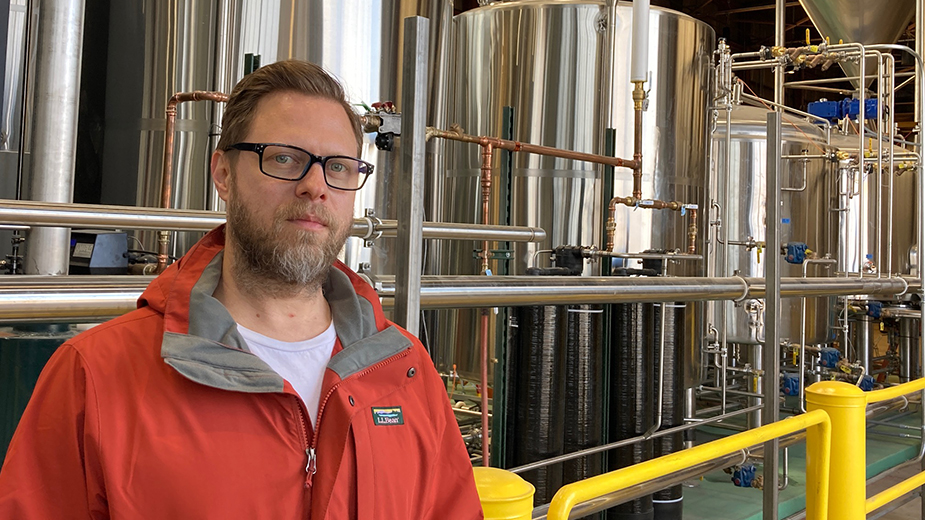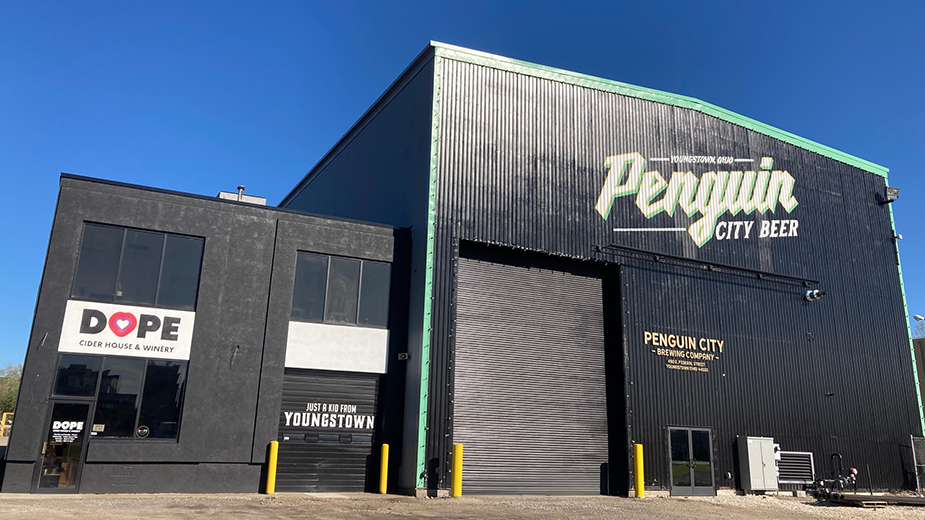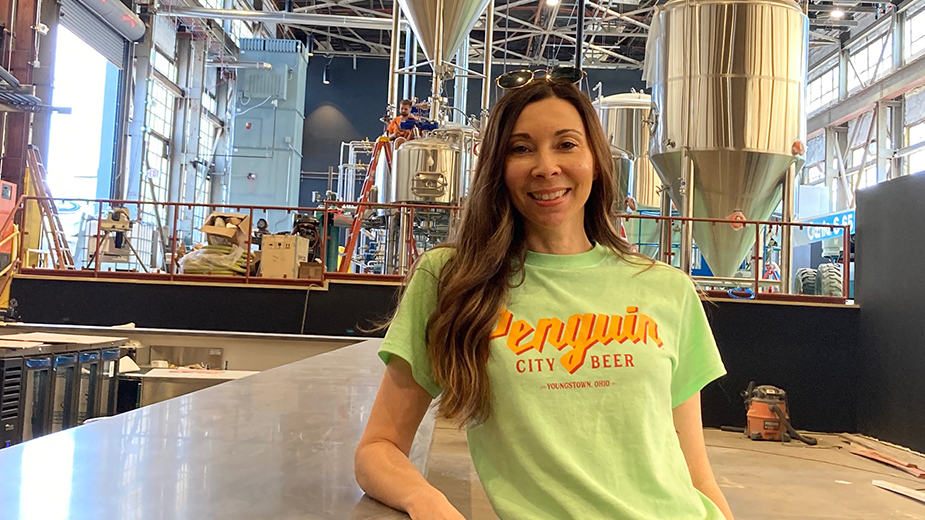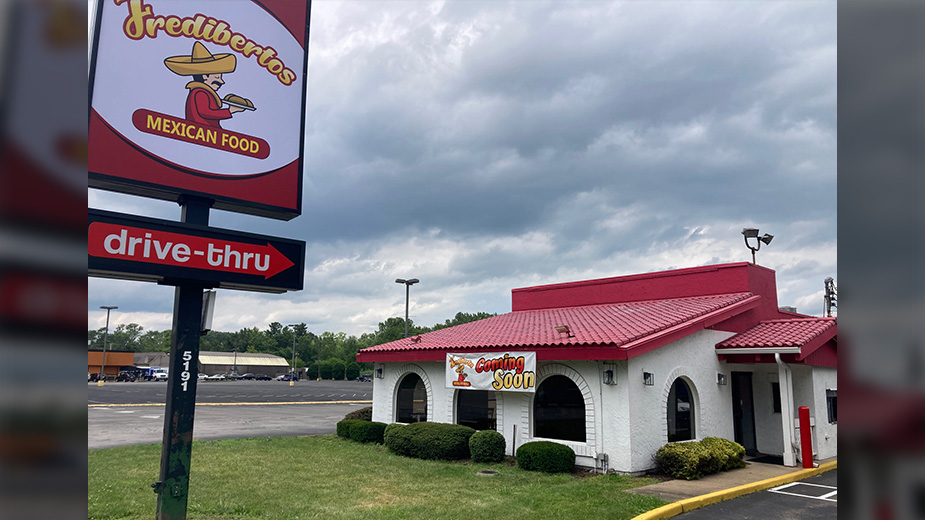Brewery Pours New Life into City
YOUNGSTOWN, Ohio – Penguin City Brewing Co.’s new $4 million home symbolizes the brand’s rapid ascent.
The brewery and tap room, which is set to open this week, will bring all brewing in-house and expand the company’s production capability.
The size of the building – a former steel company distribution center at 460 E. Federal St. downtown – underscores the project’s ambition and plays to its Youngstown image.
Large, stainless steel brewing tanks on an elevated section loom over a massive 45-seat bar and adjacent seating area that can accommodate 250 more.
Two other businesses have space in the building.
DOPE Cider House and Winery will also open this week in a separate room with its own entrance.
Cockeye BBQ of Warren will handle the food operations when it opens in the fall. Until then, food trucks will serve customers.
All three places will share a patio.
The 33,000 square-foot building sat empty for years but was renovated in nine months. Its soaring ceiling, factory windows and overhead crane assure that its industrial past is ever-present.
With the company logo painted across the front of the building and its slogan – “Tough Times Don’t Last. Tough Cities Do” – painted on the side, Penguin City is already a landmark that has brightened the formerly drab and industrial eastern edge of downtown.
The company is owned by the husband-wife team of Richie Bernacki, chief brewer, and Aspasia Lyras-Bernacki, business manager, who founded it in 2017. Michael Pontikos is brand manager.
With the project coming to fruition, Lyras-Bernacki says it turned out exactly as planned – including the location.
“I always had this building in my head,” she says. “When we first came up with the idea [to open a brewery-tap room], I thought of a huge warehouse and in this part of the city. I thought of this building.”
Penguin City’s new home also has a large event center at the rear of the structure that can be rented out. Boxing nights, sponsored by the brewery, have been scheduled there on July 16 and Sept. 17, with a third one planned for December.
The tap room will be open from noon to 11 p.m. on Wednesdays; noon to midnight Thursday through Saturday; and 11 a.m. to 5 p.m. Sundays.
PRODUCTION, DISTRIBUTION
Penguin City traces its beginning to the former brewing facility at B&O Station that once housed Rust Belt Brewing. As sales grew, it contracted out much of its brewing to Paladin Brewing of Austintown.
The company is already considering its next step – opening a warehouse and distribution building – and has begun looking at potential sites, Lyras-Bernacki says.
Penguin City Beer is currently available in about 400 bars and restaurants in the tri-state area. “We have a distributor for western Pennsylvania and West Virginia and we distribute it ourselves [in Ohio],” Lyras-Bernacki says.
With vastly increased production capability, the company now aims to expand its footprint.
“Now that we have this facility, we want to go into Allegheny County and go further into Ohio,” she says.

Richie Bernacki says Penguin City can now produce 5,000 barrels per year (one barrel is 31 gallons).
“We have four 60-barrel fermenters and two 60-barrel bright tanks,” he says. Bright tanks are used to hold beer at a precise temperature in preparation for canning, which is also done on-site.
Penguin City also has four 3.5-barrel fermenters behind the bar that hold beer that will be poured for on-site consumption. “It’s just for speediness,” Bernacki says, noting they also add to the brewery atmosphere.
The owners bought the building in 2020 for $575,000. Despite shipping costs that rose sharply because of the pandemic, the renovation proceeded on schedule. “We got a lot of sticker shocks along the way,” Lyras-Bernacki admits.
AN UNUSUAL PATH
The growth of microbreweries is well-documented. Nearly 40% of Ohio’s 400 breweries have opened in the past three years and the number keeps climbing, says Chris Crowell, editor of Craft Brewing Business, a trade website.
What sets Penguin City apart is its business model, which is the opposite of just about every other microbrewery, he says.

The company started as a beer-maker for retail distribution only, before finally opening a pub. In almost all other cases, the pub comes first with a small level of distribution to bars and restaurants following.
Crowell explains the business rationale behind the standard approach.
“Building a brewhouse is capital-intensive, so starting with a smaller system in a smaller space eases that upfront investment,” he says. “Plus, the taproom business model has a few key advantages. For one, the margins are pretty great. You are brewing beer on-site, filling kegs and selling pints from those kegs under the same roof. No food expenses. No distributor accounts to pay or manage.
“That’s the reason so few breweries have gone out of business relative to the number that have opened during this boom period.”
Penguin City took the harder path. It requires a product that pleases many people, coupled with a marketing approach that makes it stand out in a crowded market.
Crowell says Penguin City has accomplished both things.
“Where breweries get into trouble, other than making bad beer, is either failing to establish a brand identity that resonates or overexpanding by either building too much capacity or building one too many taprooms,” he says.
Getting a foothold as a retail distributor without a brewpub is difficult, and it’s even tougher for small breweries to make the margins work.
“You make less money off that same keg of beer,” Crowell says. “Plus, selling via retail involves so much more competition. You have to stand out on that shelf space next to [myriad other] breweries.”
It can be a Catch-22 situation.
“You really need that established brand to make it work,” Crowell says. “But it’s hard to establish that brand if you aren’t consistently on shelves or on taps.”
By going the old-school brewery route, and building a brand through distribution, “Penguin City has already done the hardest parts,” he says.
Although its only five years old, Penguin City has already taken on the identity of its hometown.
“You would think that they’ve been around for 100 years, like a legacy brewer like Iron City Beer, a relic of a different time,” Crowell says. “It’s that workingman’s lager, and with a name that resonates with its city.”
Penguin City’s flagship beer is a golden ale, which is part of its old-school approach.
“Most breweries that popped up in the last five years aren’t hanging their hat on a lager or ale,” Crowell says. “More like a fruited sour or a hazy IPA.”
Crowell says everything about Penguin City has that blue-collar quality. “That’s what makes it perfect for Youngstown,” he says. “It’s unconcerned with trends. They’re saying, ‘It might be a tougher business model, but we’re going to do it the tried-and-true way.”
Lyras-Bernacki says building the Penguin City brand was based on Youngstown’s history and a desire to bring back downtown to its former prosperity. “When we created this brand, we thought of the stories we heard from our families about how busy downtown used to be,” she says. “They are projected onto everything we do.”
DOPE CIDER HOUSE
With the pandemic largely in the rear-view mirror, downtown nightlife is slowly clawing its way back to the levels of a few years ago. Lyras-Bernacki believes this summer will see numbers rise to their former level.
While the Penguin City project will deliver the strongest jolt to the effort, it’s not the only one.
DOPE Cider House will provide another option. The cozy establishment next to Penguin City’s entrance has a 15-seat bar and table seating.
“If people are going out as a group and some don’t like beer but do like cider, they don’t have to separate,” says DOPE owner Ferguson.
Ferguson, a former brewer at Modern Methods Brewing in Warren, has always been a home wine maker.
She later branched into cider making – a process similar to winemaking that takes less time to ferment.
Like the Penguin City owners, Ferguson also wanted to be part of the revitalization of her hometown of Youngstown and felt fortunate when the opportunity arose.
“I was surprised that they thought of me,” she says, “but when they offered me the space, I knew it was meant to be.”
Ferguson believes people are ready to shake off the pandemic and this summer could be the turning point.
While the nightlife district is centered around the intersection of West Federal and Phelps, she believes folks will quickly realize that Penguin City is within walking distance.
For those who drive, Penguin City will have a paved 65-car parking lot with more parking available on nearby streets and parking garages.
DOPE will be open from 3 p.m. to 9 p.m. Wednesday through Friday; noon to 10 p.m. Saturday; and noon to 5 p.m. Sunday.
Pictured at top: Aspasia Lyras-Bernacki stands at the bar at Penguin City, with the brewing tanks in the background.
Copyright 2024 The Business Journal, Youngstown, Ohio.



